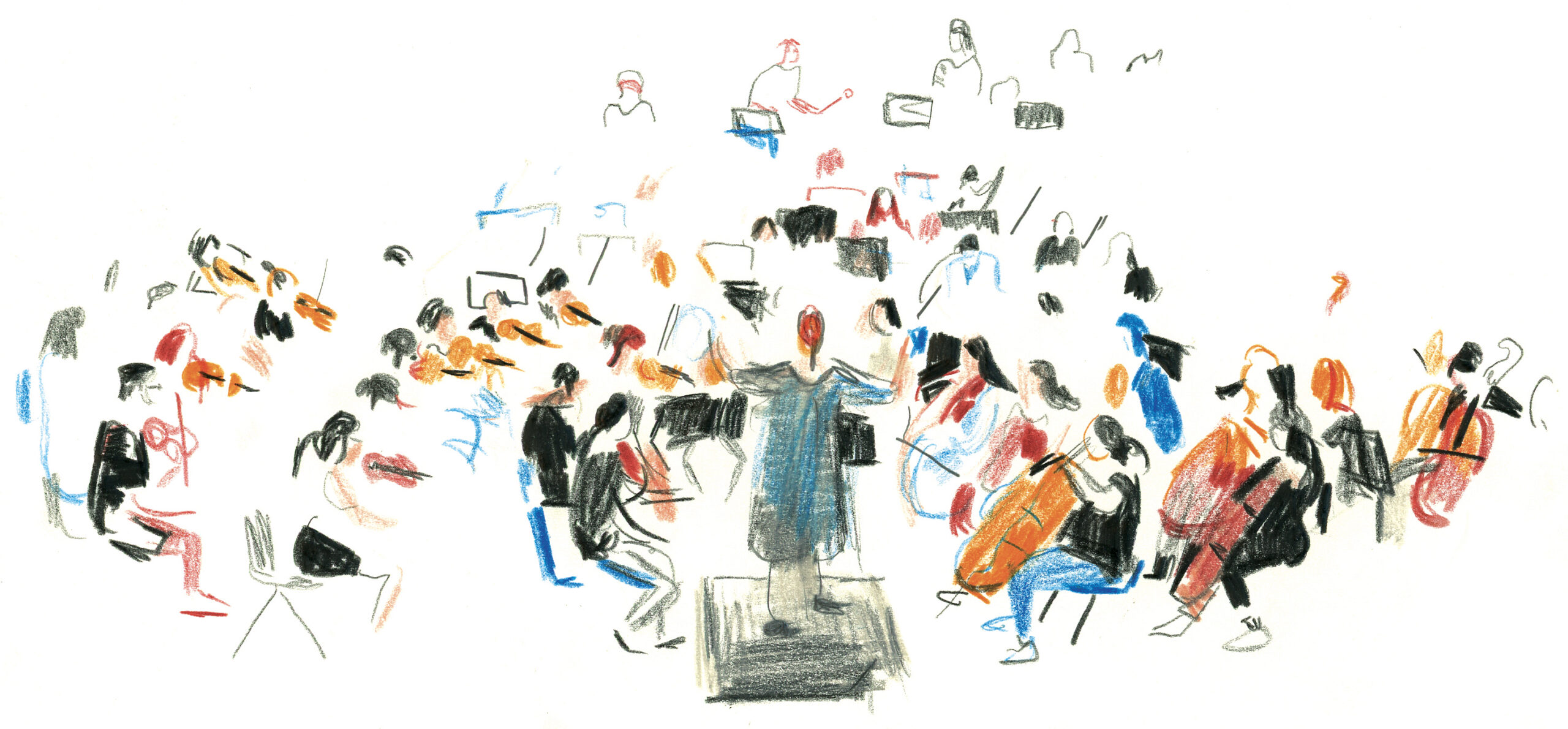Read the program for 2023
What happens when you apply to the OFJ?
Enrolling at the OFJ means taking part in up to four projects for which you can apply through a single registration and a single audition process:
- The symphony sessions, in summer and winter, form a coherent whole in two stages. They begin with a residency lasting several weeks in the provinces in August, during which the musicians work on the repertoires in depth, in sections led by professional musicians. The Musical Director then takes over. The orchestra then performs this programme in leading concert halls and/or at renowned festivals in France and abroad. In early December, the orchestra repeats part of this programme in major French venues. Between 80 and 100 young musicians take part in this session.
- In the autumn – usually during the autumn school break – the classical session is an independent session. Directed by Julien Chauvin since 2018, it explores a slightly older repertoire, contemporary with Mozart, Haydn and Beethoven, and brings together forty to fifty musicians.
- The OFJ also hosts auditions for the European Union Youth Orchestra (EUYO), which brings together young musicians from all over Europe. This is an extension of the OFJ training programme. Each year, OFJ teams work with keen candidates to prepare them for the auditions – in the autumn – for this major European project.
Find out how to join the EUYO via the OFJ

The OFJ Candidate Area
– NEW THIS YEAR : CANDIDATE AREA –

This area is your dashboard to monitor your applications to the OFJ. It allows you to submit your application and follow its progress at every stage, whether for symphonic sessions, classical sessions or the EUYO. It contains your notifications for auditions, allows you to retrieve orchestral excerpts, confirm your attendance and find out the outcome, request payment for your attendance, update your personal details and simplify your procedures from one year to the next.
It also keeps track of the payment of your OFJ application and participation fees, and enables you to put together a grant application so that you can be exempted if you are selected to join the OFJ. This is where you will find your agreements and documents to be returned if you are selected to join the OFJ, as well as your attendance certificates.
Since this entire section of the site is new, it’s possible that it will contain a few bugs or structural inflexibility, or not respond effectively to your needs, or some features may not yet be set up owing to the complexity of the system we are putting in place to centralise all the elements of your file and your applications. If this is the case, please do not hesitate to contact us to inform us of your problems and we will find the best way to resolve the issue as soon as possible.
Who can join the OFJ?
Any pre-professional musician who wishes to make a career in the orchestra, or simply discover the repertoire and life of a high-level orchestra.
Age: anyone aged between 16 and 25 on December 31st 2023 (exceptions may be made on request).
Nationality: French (and studying in France or abroad) OR a music student in France.
Music Studies: you must be enrolled in a music teaching structure. An agreement will be drawn up between your school and the OFJ setting out the educational objectives of the session, which must be signed by your school.
Minimum level required: For strings, you must be at least in the final year of your DEM (Musical Studies Diploma). For all other instruments, you must have a DEM.
In any event, exceptions may be made all for well-argued requests.
You can join us by creating an account on our candidate area and submit your application during the period of submission (usually from october-november to december).
When to apply?
OFJ applications open in the autumn between October and November, and close in mid-December so that notifications for the first round of auditions can be sent out quickly. The opening dates for applications are announced on our website, our social media, our newsletter and on posters sent to music academies.
For the first round of the auditions, all candidates are heard. The orchestra travels around France to several music academies to meet you from early January to mid-February. The jury then selects the candidates who will be invited to the second round of auditions held in Paris between late March and early April.
At the end of the second round, the OFJ announces the orchestra for the symphony sessions, followed by the classical sessions’ orchestra. Candidates who have been shortlisted in the first round can apply for the EUYO in October.
To keep track of your application and progress at the OFJ, you can use the OFJ Candidate Area to find all the details you need to know, step by step.
AUDITIONS PROCESS
First Round:
- A piece OR study for solo instrument (no piano, harpsichord or other accompaniment) representative of your instrument. If your choice is longer than four or five minutes, the jury may cut you off, exclusively for time-related reasons.
- A set of orchestral excerpts available a few weeks before your audition in your Candidate Area.
Second Round:
- A piece – sonata or piece of your choice with piano- or concerto representative of your instrument. The OFJ will provide an accompanist, unless you wish to come with another pianist.
- A set of orchestral excerpts from the repertoire you will work on during the summer, which will be available a few weeks before your audition in your Candidate Area.
- A short interview (under five minutes) to get an idea of your background and your motivation to join the orchestra.
For the first part of the first and second rounds of the auditions, we recommend choosing a piece/study/concerto that is representative of your technical level and also allows you to express your musical personality. Do not choose a piece that is too difficult technically, or a piece that doesn’t allow us to hear the qualities that you can later deploy in the orchestra.
The same pieces can be used in competitive entrance examinations for music schools (CNSMD, HEM).
The set of orchestral excerpts for the first round is a representative sample of the excerpts you could interpret in subsequent orchestral recruitment competitions.
For the second round, the jury is made up of the orchestra director and the summer session teachers.
Our criteria
Every year, we audition seven to nine musicians who wish to join the orchestra.
What we’re listening for in auditions:
- A technical background and a general level of proficiency that enable you to perform exciting – but difficult – repertoires.
- A curiosity about the works you perform that prompts you to ask yourself questions about the style of the orchestral excerpts (for example, an excerpt from a Mozart symphony does not require the same qualities as one from a Wagner opera).
- A capacity to evolve rapidly, even during very short auditions that rarely exceed fifteen minutes, but which allow us to suggest other musical avenues.
To join the OFJ, you don’t need to have played a lot of orchestra (although you should like the repertoire!). However, we do advise you to prepare carefully for the auditions, particularly the orchestral excerpts, so that we can quickly hear each candidate’s qualities.
The OFJ’s aim is to bring together young people from all over France. This is why we travel to the four corners of the country to hear you in January and February. It’s also why we make up the sections based first and foremost on musical criteria, but also taking care to ensure that the orchestra remains a meeting place where you can discover other backgrounds and experiences.
Rules & Conditions
- Registration fees for auditions: €15. We reserve the right not to listen to you if this sum is not paid on the day of your audition.
- Participation fee if accepted at the OFJ: €100. N.B. A scholarship scheme allows musicians to be exempted from these fees, subject to certain criteria.
- Attendance at the winter session is compulsory if you took part in the summer session. Much of the repertoire is common to both sessions, enabling the orchestra to develop shared practices.
- Musicians who took part in the classes of 2022 or 2023 or who were on the shortlist will be exempt from the first round and will have until 31 January to apply.
- The finalists shortlisted for the second round of the 2023 auditions will also qualify (on request) to audition in the autumn for the 2024 EUYO session.
- All candidates may request the reimbursement of their travel expenses to and from the first and second round auditions, up to a maximum of €120 per audition round (this cannot be accumulated). To qualify for these payments, you must live more than 50km from the audition centre, travel to the audition centre closest to your home or your parents’ home (for the first round), travel by train (second class only) or carpool. If you travel by car, only any motorway toll expenses will be reimbursed. By special derogation, it is possible to have a car or plane journey paid for (excluding domestic flights), as well as an audition in a centre other than the nearest one, if you can show us that it was not possible for you to do otherwise. However, there is more flexibility for double bassists who can ask for their car journey to be reimbursed according to a specific scale because of the difficulties of travelling by train with a double bass./li>
- All accommodation, catering and travel expenses during the sessions are covered by the OFJ. However, the outward journey from the musician’s home to the residence, and the return journey from the last concert venue to the musician’s home, are at the musician’s own expense. N.B. A scholarship scheme is available for musicians to be reimbursed for all travel to and from sessions, under certain conditions.
- Successful candidates must agree to appear in photos, videos and recordings, which under no circumstances will be marketed by the OFJ.
.